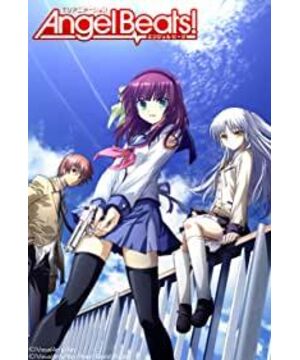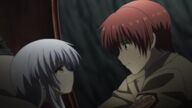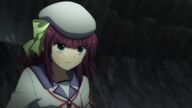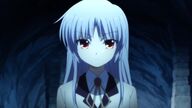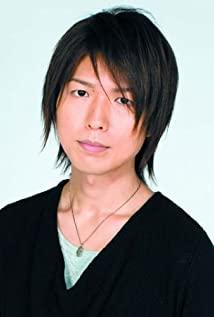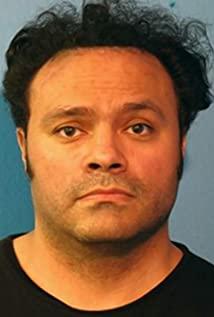Before going to the following formal question, let's take a look at a non-problem: how exactly does Angel Beats translate? All the translations available are: Surround Angel, Strike Angel, Angel Beat, Angel Pulse, and Angel Heartbeat. I think that all the gentlemen who have seen this film once will feel that "Angel Heartbeat" is the best choice. But after reading it for the fourth time this time, I really feel that the best choice is - no translation. Not because the translation is controversial, but because the translation loses some details in the film anyway. The author feels that if we let a person who has never seen AB watch this film without any spoilers or even an introduction, Yi will definitely say in the first few episodes: It should be "Burning Angels" obviously. But at the end, Yi will definitely say: It seems to be an "angel's heartbeat". Therefore, the translation into "Angel's Heartbeat" and "Angel's Pulse" is suspected of being a spoiler, but the translation into "Burning Angel" and "Battling the Angel" is not the original intention of the film at all (as for "Angel Beat"...let's forget it, see Is it called "Angel Rhythm" when you are playing the piano? Then should you call the "Gun Girl Free Ion" when you see the sharp marksmanship of Zion...). So, leave the Angel Beats as they are!
I have to say that after the AB screening, the big devil (Ma Zhijun) has been criticized a lot because he almost completely changed the styles of Air, Canon, CLANNAD and Little Busters! 1-point rate of 13.5+% and many comments), also left a lot of questions. One of the biggest is the battle for the true heroine: who is the heroine? Yuu Ion (Nakamura Yuri) or Soo (Tachikasao, Angel)? Originally, under normal circumstances, this kind of issue is something that the author is unwilling to discuss. Everyone has their own understanding. But the author believes that AB is not an ordinary situation. If you don't understand the issue of the real female protagonist properly, then there will be deviations in understanding many other issues, so I want to discuss this issue in a short space. Here, I will list various examples that support two views: core, marginal, less than satisfactory, less than satisfactory, and nonsense.
Let's talk about free ions first. As the head of the posthumous world front (SSS regiment), the length and detail of Yu Ion's positive portrayal in this film is not much different from that of the male lead Wu Yuxian, or even the former. As the first person to stand up against the gods and challenge the student council chief angel, You Ion naturally became the leader of the SSS group and the core character of the film. Although she sometimes feels like two or two, when it comes to the faction, some fans also classify it as "chaotic evil", and there is a kind of "take the blame, you come (hey, isn't it 'me'?)! To die, you go ( What? It's not 'me'?)!", but she is not only resourceful and leader at critical moments, but also a core member of the people who really fight - you know, the entire SSS regiment can barely cope with it There are not many people who can do the tricks of the angel, and the free ion is one of them. On the other hand, judging from what happened during his lifetime, Yuion was the worst of all the SSS groups—three younger brothers and sisters, one to be resolved in 10 minutes—no wonder Yuion's resentment was so deep that he had to take the lead in resisting the gods. "God, it's so unfair" "You can't even wait ten minutes in your life!" This is Yu Iion's accusation against fate - the gods treated her unfairly before she was alive, and she can't forgive her after her death. , So led the members of the entire SSS regiment to fight, to defeat the gods, defeat the angels, and complete the mission of "conquering the world after death". Let me ask: What is the core of such a person? If it is not the heroine of this film, will it still be the second female lead? The author thinks that these can basically summarize the arguments in support of the view of "free children's masters". Of course, there are people who said, "Don't you see Hiromi Sakurai (as Nakamura Yuri), who has no exception at the end of the film, whose name is in front of Hanazawa Coriander (with Rikatao)?" This is not wrong, but as a An argument is too far-fetched. A similar example is School Days. Did you see the name of Kawaragi Shiho (with Saiyuanji World) before the name of Okajima Miao (with Katsura Yanye)? But the author thinks that it seems that most people still agree that Gui Yanye is the heroine (I have read it three times, and personally still think that the world of Xiyuan Temple is the heroine, anyway). I have to say that the previous paragraph as the support of the "free children's master" cannot be more powerful && convincing.
But I just feel that the above paragraph is biased. Even if I go to extremes, I would say: If I really appreciate AB carefully and carefully, after a few times, there will never be a problem of AB's true heroine dispute. The point of "Xiao Zuo is the heroine" is that A conclusion that must be drawn after watching this film (ie, if the opposite conclusion is drawn, then it must be a matter of time and space). So, why are there so many disputes? Because among those who support "Zuo is the heroine", there are always a few people who are particularly fond of Hu, and there are also a few elementary school monks who believe it. These are purely verbal opinions: 1. If Zou is not the heroine, why is the title called Angel Beats? 2. You Ion did not have a positive result with the male lead, and even had no meaning at all, and Zou and Yuxian were CPs. After passing through his younger sister Hatsune before his death, the male lead finally revealed to Xiao Zuo how he liked to play after his death. After the reincarnation, I played "the string and played", めでたしめでたし (congratulations, congratulations)! Regarding 1, you may have forgotten a classic counterexample - Maupassant's short story "My Uncle Jules", so the protagonist does not need to argue at all, of course it is Jules! But in fact, the protagonists are Philip and his wife; for 2, the author just wants to say: "Can you find a more ridiculous reason than this?" Anime, kukuku…
So, why does the author insist that Zou is the heroine? From the example of "My Uncle Jules", we can see that we must analyze what the author's purpose is in making this film. Although the author may not be qualified to talk about this issue, because the author's understanding of the Great Demon King may also be biased, but in the words of "literary girl" Amano Toko (or Inoue Toko!): "We may never be able to. I know what the client thinks, but we can reasonably 'imaginate'!" In order to be able to 'imaginate' more reasonably, the following question must be solved here: Why did the male protagonist Yuzuru come to the afterlife? After the male protagonist regained his memory, until the last episode, before Zou revealed the shocking secret to him, the male protagonist did not understand why he came to the afterlife: he made up his mind because of his sister Hatsune, although he died in the dream of realizing his dream. On the way, but in the 7 days that his life was about to end, he helped all the trapped people to heal, and also donated all his organs before he died, maybe he could save more people. Unlike other SSS members, he no longer has any regrets, so why does he still appear in the afterlife world, a gathering place for people who have regrets before their death? Is it a bug like the creator of Angel Player (in fact, this may not be accurate, and the producer's situation may not be a bug, maybe it is the same as Yu Xian's situation, but he is much more unlucky than Yu Xian, staying in the afterlife)? To explain why Yuzuru is in the afterlife, we have to look at why Sakura is in the afterlife. So why does the concert appear in the afterlife? This one is very simple, the finale says "My only regret in life is not being able to say 'thank you' to the benefactor who saved my life". Let me ask: If Yu Xian does not lose his memory, when will Xiao Zou supersede? With Zou's clumsy expression, when will she "walk all the way, alone"? When will she be able to "by then I will no longer be strong and let my tears flow like an ordinary girl"? This will be another "forever" ending. In fact, with the understanding of this point, it is possible to solve a chronological problem: why did Yuxian die before Zou, but it took a long time to go to the afterlife world? This is by no means the big devil's mistake. After realizing the above, I think it is not difficult to understand this point.
With the above understanding, let the author "imagine" the purpose of the big devil in combination with the plot. We can also see from the film that even in the afterlife world, a gathering place for boys and girls who could not enjoy their youth during their lifetimes, there are people with two kinds of consciousness: one is the SSS group headed by Xion. Members of the group, they cannot accept such an unfair fate and must resist the gods to the end, and Yuion is the representative of having this kind of consciousness; They are NPCs, and NPCs are more like stylized existences), they have accepted their own destiny, enjoyed the youth they should have enjoyed in the afterlife world, experienced the warmth of love, disappeared, and played with representative of this consciousness. Seeing this, we will find that Kanade's loneliness is doomed - as she herself said, "there is no such thing (companion), because even if there is, it will disappear". Poor little play! He clearly had many friends in this world, and had such a time of laughter, but it was precisely because he could not come to the conclusion that his regrets during his lifetime could not be filled at all, and he was never able to survive! Zou also wanted to tell the members of the SSS group: how beautiful it is to enjoy life, but because of Zou's clumsiness, she couldn't convey what she wanted to convey at all, so she programmed the force against the SSS group and started a life of using violence to control violence. In fact, the confrontation between the SSS group and Naruto is the confrontation between these two consciousnesses. So, what kind of consciousness does the author endorse? We can see from some details. The best example is to look at the ending: under the persuasion of the two of them, everyone gave up. After learning the whole truth, You Ion, the leader of the SSS group, learned that his goal for many years - ruling death. After the world - when it is about to be realized, I first laughed at myself, and then slammed into the computer there with AK, and finally resolved my obsession and graduated from here. Let me ask, if the author really wants to "resist and end", what is the purpose of describing these thoughts later? Let Kan and Yuion be cute? Bored? Eating food is bad for your brain? Obviously not. As long as we "imagine" the author's ultimate goal in this way, we will get out of the misunderstanding of the role factor. No matter how detailed and vivid the frontal portrayal of You Ion is, she can only be the second female; and no matter how little and indirect the portrayal of the duet is, even if the performance is silent (the last episode probably accounts for 50% of the entire 13 episodes). %), she is also the heroine. Therefore, many people conclude that "the female supporting role (not necessarily the second female lead) is more popular than the female protagonist", and they will list "Takasaka Kirino vs Wugen Ruri" and "Suzumiya Haru" without thinking.
In addition to the discussion of the real heroine, there are several other issues that I would like to briefly discuss.
1. Why did Xiaozao and Yuzhan come to the afterlife? This has been discussed just now.
2. It is also a question that troubles many people: why did Yu Xian die before Xiao Zuo, but then go to the afterlife? This has just been discussed. The other two points of view are: A) The big devil's mistakes were not taken into account. How to say it? As someone who is known for details, making this kind of mistake feels really impossible. B) There is no sign that you must go to the world after death first, you forget that the soul may be floating in the second world? There is nothing wrong with this explanation, and it is indeed wrong to assume that "first come, first come", but the problem is that this explanation is a bit like "you lose if you are serious" Too respectful.
3. In the finale, is Sata's feeling for Yuzuru love or just gratitude? To be honest, the author's degree of confidence in this question is not as high as "who is the real heroine", so I am not very sure about the result of my "imagination". The author prefers to think: it is love. Some of you may gonna argue: Before Xiao Zou disappeared, the two embraced each other, and Xiao Zou didn't say "Yu Xian, love している" but always "thank you": "爱してくれて, ありがとう. Life を く れ て, Ben dang に あ り が ろ う! (Thank you for loving me, you gave me life, thank you so much!)" This is obviously a rhythm of euphemistic card issuance, where is the rhythm of love? I have to say that this is also the question that puzzled me the most. After reading it, I understand it. If you don't like Yuzana, but just want to express gratitude to Yuzuru, why should you ask Yuzana "さっきの言葉, もう Once you say って... (What you said just now ("I like you"), please say it again) ", she only needs to say "thank you" herself, and after conveying her heart to Yuzuru, she can disappear, so why bother? As for why Na couldn't say "I love you too", the author thinks: A) Nao was not good at expressing herself, she was a bit stupid, her greatest wish during her lifetime was to say "thank you" like a savior. Let’s talk about the more important things first; B) After experiencing so many events before and after death, Zou felt that this kind of thing (confession and acceptance) was more suitable to happen in the next life. What is the relationship between good things, that is to say, she hopes to start over with Yuzuru. Of course, in fact, whether A or B added later, the author himself does not think it is very convincing, it is just a personal feeling.
4. How do you understand the plot given after the ending song of episode 13? Two understandings are: A) it was the encounter between Zao and Yuzian after reincarnation; B) Zai and Yuzian after reincarnation had been in a relationship for a long time, and that was one of their dating clips. The author is more inclined to the latter understanding, which is similar to the manfriends who support the latter understanding, mainly: A) The two wear the same accessories; B) Kung is obviously waiting for someone, and it has been waiting for a long time (Yin Wu Yu Xian) How dare you be late? If your girlfriend is Ayase, kukuku...); C) Yuzuru heard Sou humming my song and put his hand directly on her shoulder, which is still too intimate for a stranger who met for the first time. Of course, these three items are still based on the basis of trying to eliminate coincidences when understanding the problem. If you think it is just a coincidence, then of course there is nothing wrong with the first idea.
5. Which of the two endings after the disappearance is more reasonable? One is the true ending, which is the ending after 13 episodes of the ending song; and the other is the ending given in a short 13.5 episodes: the play disappeared, and Yuzhan stayed in the afterlife world and became the student council president. One day, finally, a student was upset and slapped the table, and Yuxian handsomely asked him to go to the student union to find him and directly challenge him. During the discussion, everyone learned that Yuzuru had no girlfriend, and he was still waiting for someone. Before watching it again, I was open to both endings, because after all, there is no sign that Yuzuru has to leave the afterlife. But after opening it this time, I feel that the second ending is simply a stubborn for making a sequel (fortunately, no sequel was made from this), which fundamentally goes against the original intention of the author. We can make an analogy like this: How similar the situation of Yu Xian is to the producer of Angel Player, who had no regrets but entered the afterlife world, the producer of Angel Player was unable to leave, and waited for her arrival for many years (God! Die tragically again and come in again?!), finally unable to bear the pain of waiting, program turned himself into an NPC. Just think, if you go to the second ending, isn't this the old American movie Looper? ! History will go on like this again, and there will be another Ion and another Hyuga to take the lead in resistance, another play to suppress, another Yuxian to mediate, and the real Yuxian has become an NPC... God! Desperate enough to think about it. Of course, I know that many people like this kind of reincarnation ending, and Imen also like the endless August and the never-ending June of Hinamizawa. But the author feels that this is really superfluous, and all the meanings have been clearly expressed, and it is enough to end here. Besides, if it is the second ending, the author is more willing to believe that it was made by Lao Xu (Xu Yuanxuan), not the big devil.
The above questions are some thoughts and re-examinations after reading them for the fourth time. They are recorded here for later review.
View more about Angel Beats! reviews


